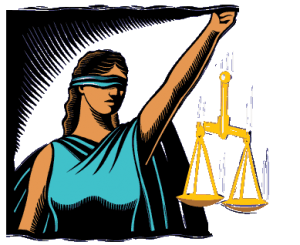Litigating Legality: The “Secret Justice” of the U.S. Federal Judiciary
 The United States’ federal judiciary is turning its back on constitutionality. With the emergence of several legal cases involving the complicity of the United States in tortures and disappearances that have occurred over the past decade, it is becoming increasingly evident that our justice system is corrupt. According to writer Scott Horton of Harper’s Magazine, the way the judiciary has dealt with two specific cases–those of José Padilla, who was tortured while in U.S. custody, as well as Latif, a Yemeni who was alleged to have ties to terrorist organizations–demonstrates how “legal prohibitions on torture are being destroyed through secrecy and legal sleight of hand, and our justice system is being distorted and undermined.” In the case of Padilla, a suit was filed by his mother against torture-memo author John Yoo, under who’s advice Padilla was unjustly tortured. Jay Bybee, allegedly Yoo’s memo’s co-author, is now a member of the judiciary. Thus, unsurprisingly, Yoo was granted immunity, as the court “conclud[ed] that the law surrounding torture was so muddled when he dispensed his advice that he should be given the benefit of the doubt.” In the case of Latif, a “thirty-six-year-old Yemeni who has spent the past ten years of his life in prison in Guantánamo without being charged and with only vague suspicions connecting him to terrorist groups,” the judiciary is reversing an October ruling that the suspect should be released. According to Judge Janice Brown (appointed by George W. Bush), the “analytical report on Latif prepared by CIA officers—who were under immense pressure to justify detentions even when the evidence plainly indicated very little to no basis for them, as Glenn Carle and other CIA case officers have openly acknowledged—was entitled to a ‘presumption of regularity.'” This essentially enables any judiciary committee to manipulate the U.S. justice system to fit their own self-serving caprices. Horton refers to this phenomenon as “the ascendance of a ‘justice of secrecy’ in American courts.” Explains the author:
The United States’ federal judiciary is turning its back on constitutionality. With the emergence of several legal cases involving the complicity of the United States in tortures and disappearances that have occurred over the past decade, it is becoming increasingly evident that our justice system is corrupt. According to writer Scott Horton of Harper’s Magazine, the way the judiciary has dealt with two specific cases–those of José Padilla, who was tortured while in U.S. custody, as well as Latif, a Yemeni who was alleged to have ties to terrorist organizations–demonstrates how “legal prohibitions on torture are being destroyed through secrecy and legal sleight of hand, and our justice system is being distorted and undermined.” In the case of Padilla, a suit was filed by his mother against torture-memo author John Yoo, under who’s advice Padilla was unjustly tortured. Jay Bybee, allegedly Yoo’s memo’s co-author, is now a member of the judiciary. Thus, unsurprisingly, Yoo was granted immunity, as the court “conclud[ed] that the law surrounding torture was so muddled when he dispensed his advice that he should be given the benefit of the doubt.” In the case of Latif, a “thirty-six-year-old Yemeni who has spent the past ten years of his life in prison in Guantánamo without being charged and with only vague suspicions connecting him to terrorist groups,” the judiciary is reversing an October ruling that the suspect should be released. According to Judge Janice Brown (appointed by George W. Bush), the “analytical report on Latif prepared by CIA officers—who were under immense pressure to justify detentions even when the evidence plainly indicated very little to no basis for them, as Glenn Carle and other CIA case officers have openly acknowledged—was entitled to a ‘presumption of regularity.'” This essentially enables any judiciary committee to manipulate the U.S. justice system to fit their own self-serving caprices. Horton refers to this phenomenon as “the ascendance of a ‘justice of secrecy’ in American courts.” Explains the author:
This flavor of justice aims to use American courts and legal processes to validate torture and other abusive practices, to validate the supposed benefits America has received from these practices, and to shield political actors and their helpers. The justice of secrecy also applies a presumption of truth to classified information and frustrates efforts to challenge it.
As these cases continue to gain coverage, it is important that political leaders, as well as an educated public, will be able to combat these heinous acts with a resoluteness and courage.
Click here for the full story.












